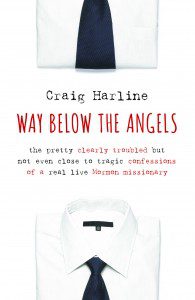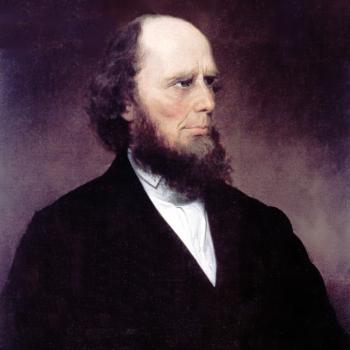There are many good reasons to read Craig Harline’s Way Below the Angels: the pretty clearly troubled but not even close to tragic confessions of a real live Mormon missionary.
First of all, it offers solid proof that at least some historians have a wicked sense of humor and can employ it in writing. This is helpful when discussing an estimated 6,700 encounters with people who reject your message.
 Second, and this might be helpful for Anxious Bench readers, Harline gives you a glimpse into the interior world of those smartly dressed Latter-day Saint missionaries you are bound to encounter from time to time. Well, at least into his memories of his interior world from forty years ago. It was a world of hubristic hopes of converting scores of Belgians, a place of intense self-doubt and anguish and insecurity, and a heart longing to connect with God and with the people around him.
Second, and this might be helpful for Anxious Bench readers, Harline gives you a glimpse into the interior world of those smartly dressed Latter-day Saint missionaries you are bound to encounter from time to time. Well, at least into his memories of his interior world from forty years ago. It was a world of hubristic hopes of converting scores of Belgians, a place of intense self-doubt and anguish and insecurity, and a heart longing to connect with God and with the people around him.
If I had recurrent nightmares, they would probably be of beach evangelism. My sister, I believe, once went on a beach evangelism spring break trip with Campus Crusade for Christ. One former Crusade staff member I once interviewed recalled beachgoers fleeing as the evangelists approached the beach. Kevin Roose, in his Unlikely Disciple, recounts that many people laughed when they realized that he and his fellow evangelists revealed their purpose was to talk about Jesus. I’m not asserting that Crusade and other organizations shouldn’t do beach evangelism. I’m just saying that I have never wanted to volunteer for endless, embarrassing, and comical rejection.
And even if one’s church expects its young men (and, increasingly, encourages its young women) to serve a mission, and even if by accepting a call do so one gains a greater measure of eternal glory and curries favor with prospective girlfriends, it’s still an incredibly hard thing to do. Harline had to somehow find both the chutzpah and perseverance to drag himself back out there for ten hours a day. It was not easy. In one failed missionary encounter, a “vintage old man started shouting a lot more words I couldn’t understand, then grabbed the both of me and Elder Klein by the arm, from behind, and commenced shoving us toward the front door.” It ended, Harline writes, with “a small but powerful dress shoe to my backside.” As Harline reflects, “it wasn’t fun … it felt completely humiliating and horrible to be disliked by someone who didn’t even know you.”
This is a long way of saying be nice to missionaries. Evangelical, Mormon, Jehovah’s Witnesses, and otherwise. Perhaps there are some exceptions to this rule, but probably not that many. Let missionaries in if it’s not a terribly convenient time. Offer them something to eat. The majority will appreciate your kindness even if you don’t want to hear anything about their message. After all, they don’t expect you to receive their message! And even if you think their message is terribly misguided, it’s better to show them some love instead of treating them like either a complete nuisance or as minions of Satan.
Third, Harline’s book contains poignant and profound messages for all followers of Jesus Christ. It is incredibly easy to put on airs, compete with one’s fellow believers for spiritual and ecclesiastical honors, and ignore Jesus’s commands to love both one’s fellow Christians and one’s neighbors. One can’t really love one’s fellow missionaries while wanting to gain more converts and prestige than them. Likewise, one can’t love the people one encounters if one only sees them as prospective converts.
In the depth of his misery, Harline feels God gently speak to him, Just be yourself. As Harline observes, this seemed to fly in the face of nearly all scriptures and sacred histories “about not being content with yourself, but … [becoming] what God wanted you to be(come), to lose your (presumably ordinary) self in order to find your true (presumably great) self.” One might read that in Augustine’s Confessions, but not in Harline’s, at least not immediately:
it turns out you don’t always want to be you, because you know very well all the spectacular failures and character flaws lurking around inside, and you think that maybe it’d be nicer to be someone else instead, who obviously doesn’t have all those failures and flaws. You also know that God knows all about your lurking failures and flaws too, and you suppose He doesn’t like them and wants you to be a much-more-acceptable-to-Him you. And you especially know that the people around you … don’t really want you completely to be you either … so you end up trying to be someone else instead.
After this encounter, Harline haltingly starts trying to be himself, or really, a much better self. He notices the beauty of his environs. He forms lifelong friendships with Belgians who never evidence any interest in baptism. Once he assumed a local position of leadership within a mission, he even institutes a third daily meal (the missionaries had been eating two meals a day to maximize proselyting time).
Harline’s book is unlikely to end up on the very short list of books approved as references for Latter-day Saint missionaries. In fact, I don’t think even twenty years ago a BYU professor would have published such a candid memoir of missionary angst. Mormons have begun carving out a small safe place for the discussion of doubts and struggles (see Terryl and Fiona Givens’s The Crucible of Doubt, for example). Still, Latter-day Saint culture resembles a Mormon version of the victorious life much of the time.
At the end, Harline suggests that it would help future generations of missionaries if they would receive more realistic information about the struggles they might face during their missions. And he favors more service and less proselyting. My sense is that the LDS Church is considering such things, though not to the extent Harline would recommend.
For interested outsiders, Way Below the Angels offers a funny, thoughtful, and eloquent window into a key part of Mormon practice and culture. Reading it, despite Harline’s sometimes painful experiences, was pure pleasure.












